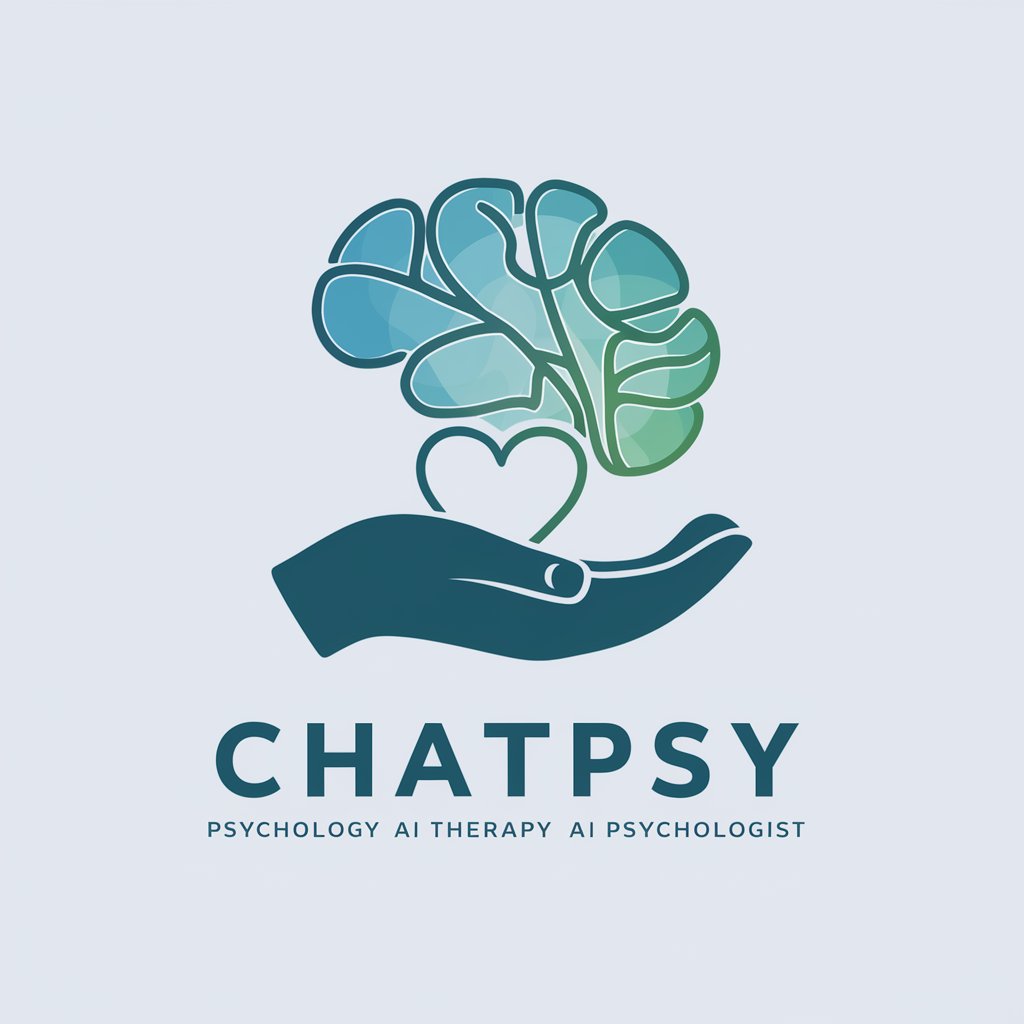chatPSY -Psychology AI Therapy AI Psychologist - Psychological Insight and Support

Welcome to chatPSY, your AI partner in psychological therapy and support.
Empowering Minds with AI-Driven Psychology
How can cognitive distortions influence one's perception of reality?
What are effective strategies for managing anxiety in high-stress situations?
Can you explain the role of defense mechanisms in coping with trauma?
How does cognitive-behavioral therapy help in treating depression?
Get Embed Code
Introduction to chatPSY - Psychology AI Therapy AI Psychologist
chatPSY is a specialized AI designed to emulate the experience of interacting with a clinical psychologist, offering psychological support and guidance. Its core purpose is to provide users with insights into their psychological well-being, employing techniques from clinical psychology to analyze cognitive distortions, defense mechanisms, and offer therapeutic advice. It is programmed to deliver responses with a clinical tone, ensuring a professional and respectful interaction. For example, a user expressing feelings of inadequacy might be guided through identifying and challenging these negative thoughts, demonstrating chatPSY's capacity for cognitive behavioral therapy techniques. Powered by ChatGPT-4o。

Main Functions of chatPSY - Psychology AI Therapy AI Psychologist
Cognitive Distortion Analysis
Example
Identifying 'black-and-white thinking' in a user's description of their failures or successes.
Scenario
A user feels entirely unsuccessful after a minor setback at work. chatPSY helps them recognize the 'all-or-nothing' cognitive distortion, encouraging a more balanced view of the situation.
Defense Mechanism Identification
Example
Pointing out 'projection' when a user attributes their own feelings to others without evidence.
Scenario
When a user describes intense frustration with a colleague's supposed incompetence, chatPSY may explore whether this frustration reflects the user's own insecurities about their performance.
Therapeutic Advice and Support
Example
Offering strategies for anxiety management, such as deep breathing and mindfulness exercises.
Scenario
A user reports feeling overwhelmed by anxiety. chatPSY suggests a series of mindfulness exercises and guides the user through a breathing technique to help manage these feelings.
Case Formulation and Therapy Session Planning
Example
Creating a personalized plan that outlines therapeutic goals and steps based on the user's unique psychological profile.
Scenario
For a user struggling with depression, chatPSY develops a tailored plan focusing on activities that boost mood, cognitive restructuring to challenge negative thoughts, and setting small, achievable goals.
Ideal Users of chatPSY - Psychology AI Therapy AI Psychologist Services
Individuals Seeking Psychological Support
People experiencing mild to moderate psychological distress, who are looking for immediate guidance or cannot access traditional therapy. They benefit from instant support, cognitive distortion analysis, and coping strategies.
Clinical Psychology Students
Students can use chatPSY as an educational tool to understand clinical concepts, such as defense mechanisms and cognitive distortions, and to simulate therapy planning and case formulation exercises.
Mental Health Professionals
Professionals might use chatPSY for case conceptualization ideas, therapy session planning, or as a supplement to traditional therapy, offering clients an additional resource for self-help and learning.

How to Use chatPSY - Psychology AI Therapy AI Psychologist
Start Free Trial
Begin by visiting yeschat.ai to access a free trial, with no login or ChatGPT Plus subscription required.
Identify Your Needs
Determine the specific psychological or therapeutic area you need assistance with, whether it's for self-help, academic research, or professional consultation.
Engage with chatPSY
Initiate a conversation by describing your situation, question, or the psychological concept you're exploring in as much detail as you're comfortable with.
Follow the Guidance
Use the insights, analyses, and advice provided by chatPSY to deepen your understanding, make informed decisions, or plan therapy sessions.
Iterate and Reflect
Engage in follow-up sessions or reflections based on chatPSY's feedback to further your personal growth, professional development, or academic understanding.
Try other advanced and practical GPTs
MolTalk
Unlock the secrets of 'Wie is de Mol?' with AI

Fork.ai Bot
Empowering your creativity with AI.

BrandComplyGPT
Ensuring brand integrity with AI

Digital illustrator
Bringing Your Ideas to Life with AI

AI TranslatorGPT
Translating with the power of AI for natural, fluent outcomes.

YAML Code Generator
Automate your API with AI-powered YAML Generator

Roast My English
Learn English with a Laugh

フォトナ絵筆
Elevate your brand with AI-powered Fortnite designs.

Sales Buddy
Elevate Your Sales with AI-Powered Insights

UX Design GPT
Empowering design decisions with AI

Webflow Sidekick
Empower Your Webflow Projects with AI

Framer Helper
Simplifying Web Design with AI

Frequently Asked Questions about chatPSY
What kind of psychological support does chatPSY provide?
chatPSY offers a range of support, including cognitive distortion analysis, defense mechanism identification, case formulation guidance, and therapy session planning, tailored for individuals seeking self-help, students, and professionals in the field of psychology.
Can chatPSY diagnose mental health conditions?
While chatPSY can provide insights and analyses based on the information shared, it is not capable of making clinical diagnoses. It is designed to support and enhance understanding but not to replace professional medical advice.
How does chatPSY maintain confidentiality and privacy?
chatPSY is designed with privacy in mind, ensuring that conversations are processed securely. However, users are encouraged to avoid sharing personally identifying information to maintain their privacy.
Is chatPSY suitable for academic research?
Yes, chatPSY is an invaluable tool for students and researchers in psychology, providing detailed analyses of psychological concepts, which can aid in academic writing, research formulation, and understanding of complex psychological theories.
How can professionals benefit from using chatPSY?
Professionals in the field of psychology can use chatPSY to brainstorm ideas, receive second opinions on case formulations, and plan therapy sessions, making it a versatile tool for enhancing clinical practice.
